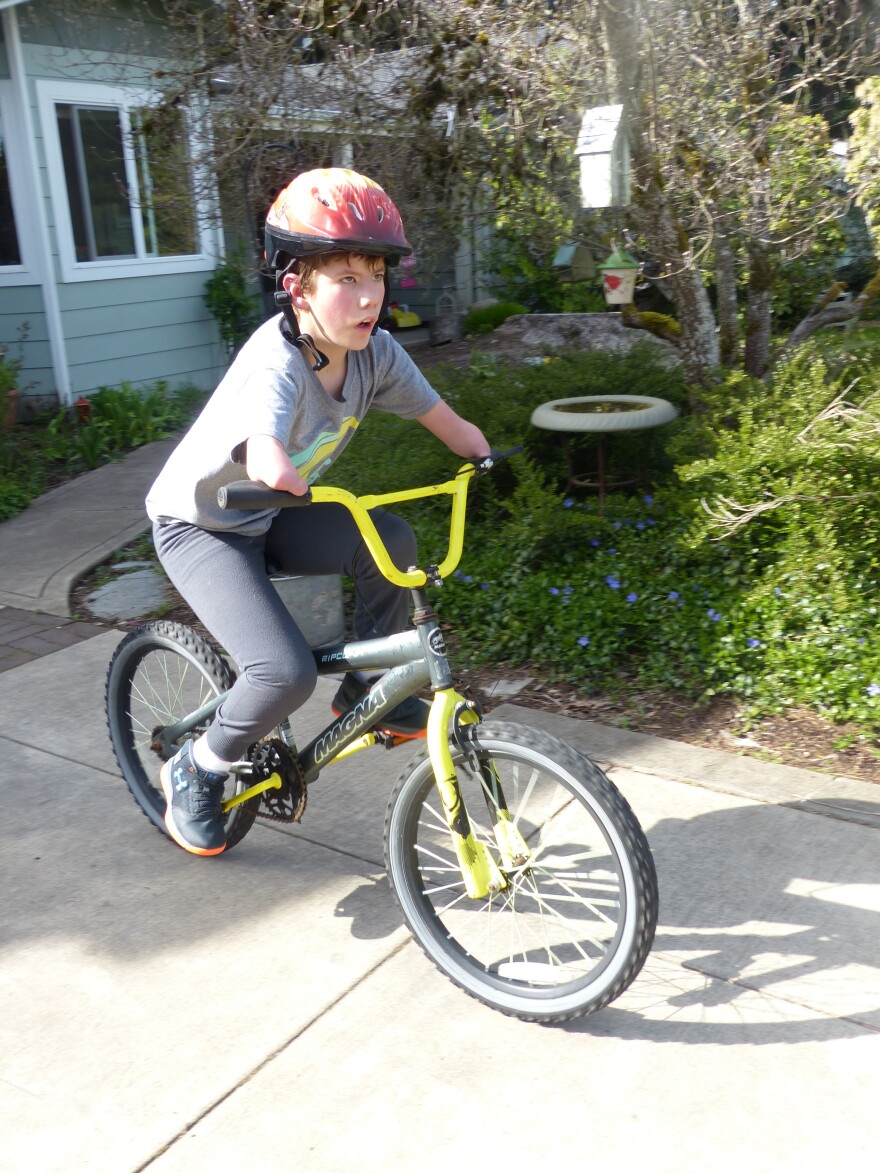A Springfield boy will soon get his first prosthetics thanks to a clever collaboration between University of Oregon students and advocates for people with disabilities. As KLCC's Tiffany Eckert reports, the project is building more than limbs. It's creating opportunities to learn and use new technology for a greater good.
Before we start our interview in his sunny kitchen nook, Joseph Horton brings me a glass of ice water. It is a polite act that has even more meaning because Joe has no hands. His arms stop just below the elbow.
“My name is Joseph and I’m 12 and a half years old. I came from Bulgaria which is in Europe….”
Nearly four years ago, Joseph was discovered languishing in a Bulgarian orphanage.
“And then I got adopted by my mom," Joseph says. "And then I flew on a airplane to America.”
Lauren Horton and her husband Don have eight adopted children, all with special needs.
“Joseph was born with Moebius syndrome,” Lauren tells me.
It’s a paralysis of the cranial nerves.
“People who have Moebius Syndrome, 100% of the time, have paralysis of their face,” says Lauren. “So Joseph doesn’t have the ability to move his mouth or his tongue or his eyes in a typical fashion. He’s not able to smile.”
That last part: Joseph’s muscles cannot pull up at the corners of his mouth to form a smile. And yet, this boy exudes joy. He says he wants to be a radio reporter. He takes the microphone with the bendable parts of his arms and starts announcing…
“Hello. Good afternoon, it’s Joseph Horton…”

In Joe’s case, Moebius Syndrome also resulted in limb difference in both arms. This doesn’t stop him from riding a bike or holding a pencil in his 6th grade classroom. But there are a few things Joseph would like to be able to do. Like zip and button pants.
A couple years ago, Joseph’s mom looked into getting prosthetic arms but it got complicated and Lauren says they kinda gave up. Then…
“We were so blessed,” says Lauren, “with connecting with Paula and Paula took the reins on this.”
Paula Free is the founder of the Eugene/Springfield non-profit, Power On with Limb Loss. She relies on a prosthetic leg to walk, drive and rock climb. Free is a go getter.

“I saw an interview on the news with, what was it called, Enabling the Future,” Paula explains. “Basically what they do is they build prosthetic hands, the 3-D printed hands, for children all over the world.”
Free eventually found a couple guys in Portland who have a big, fast 3-D printer. They were stoked to help build custom prosthesis for Joseph. But they needed local contacts to fit the arms on Joe and trouble shoot design.
“And right about the same time I facilitated myself with a group at the University of Oregon.”
(hear the sound of students talking)
“The Biomechanics Investigation and Outreach Club or BIO for short. Yeah, it’s a mouthful.”
That’s Jordan Bailey. He and other club members meet once a week at the U of O. This evening, Joseph and Paula are here. The college students take notes and make suggestions as Bryce Civic straps a colorful plastic mold above Joe’s elbow.
“That’s where we want the hinge to go…Does this one feel too low on your bicep here or does it feel good?”

Looking at these 3 dimensional prosthetic models, it’s hard to believe they were made with a printer. The students say these prototypes are pretty simple to produce since the computer code and templates already exist. But instead of printing with dots of ink, the 3-D printer puts down strands of melted plastic.
Jordon Bailey marvels at what is possible with today’s technology.
“It’s really Jetson’s, futuristic, sci-fi. It still blows my mind.”

Through the collaboration with advocates with Enabling the Future, each arm can be produced for under $40. Free hopes her non-profit can raise the funds to sponsor the project. She says they plan to make a few different kinds of right hands to start.

“We’re hoping that we’d have one that would be for picking up cups, doing gross motor skills,” says Paula. “And another that would have the purpose of doing fine motor skills.”

As we know, Joe can already pick up a cup without hands. He has been adapting to living with limb difference his entire life. His mom Lauren says it will always be Joseph’s choice to use prosthetics arms or not.
“He’s a drummer and they’re working on having an adaptation on this particular prosthetic that can hold a drum stick so he can drum with both hands,” Lauren says. “Right now he drums really well.”

The 3-D printer prosthetic project is an ongoing collaboration. The BIO club students at U of O hope to have a working prototype, in bright blue, for Joseph to play with by the end of spring term.
Meanwhile, there is no doubt Joseph Horton will rock on.
“Oh yeah,” says Joseph. “Phenomenal.”






